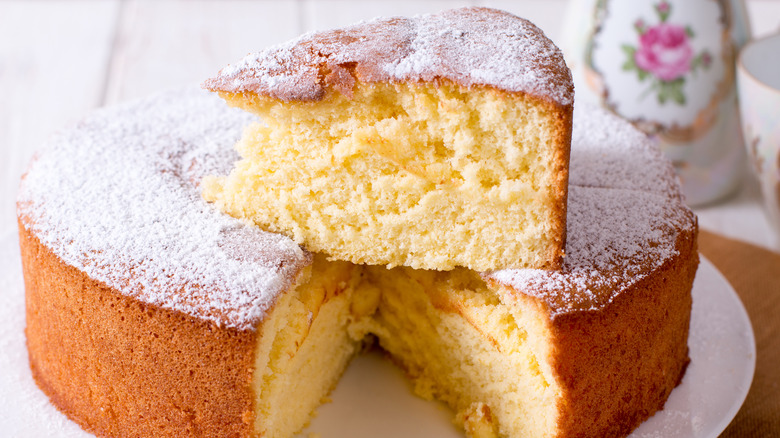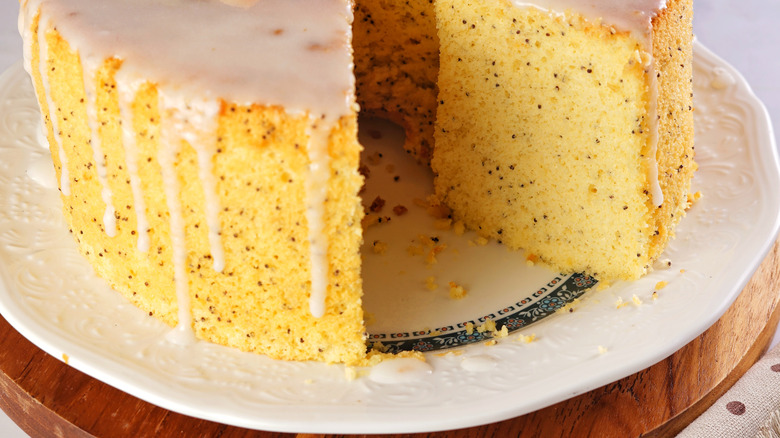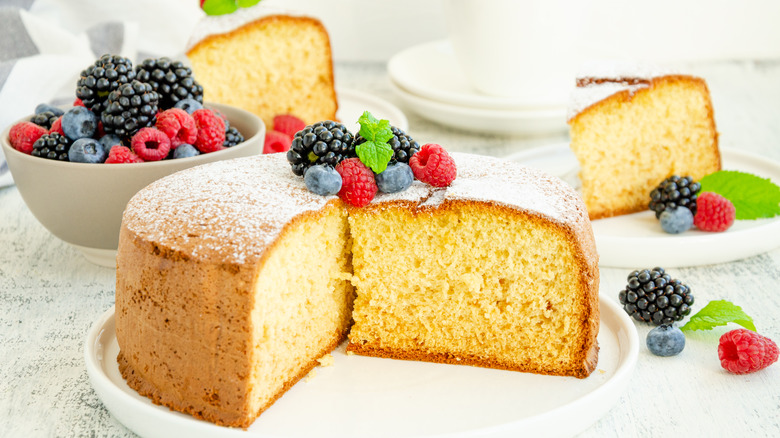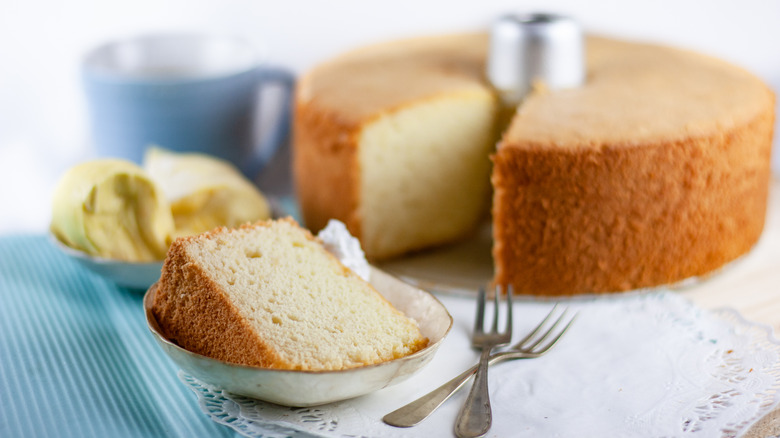The Real Difference Between Chiffon And Other Sponge Cakes
Of the variety of cakes out there, it can be hard to discern which to bake. From the average vanilla to the hearty pound cake, and many variations in between, there are so many options to choose from. When it comes to the most popular, it's hard to beat the versatile chiffon cake and sponge cake, which are the basis of many fan-favorite desserts. These two cakes can easily be confused thanks to their similarities, but they also contain quite a few differences, too.
According to Cook's Info, sponge cakes should be bouncy and lightweight in texture, like a sponge, but they can be formed into many different molds and mixed up in a variety of different flavors. Similarly, Baking Bites describes chiffon cake as moist, soft, and tender, but what sets it apart from sponge cake is that egg whites are mostly responsible for its foamy texture. So which one is easier on your wallet and your gut? We'll break down all the other ways to differentiate the two cakes and what to know about them.
The history of sponge cake and chiffon cake
According to What's Cooking America, the sponge cake first came on the scene in 1615, where the earliest recipe was said to have been adapted by Gervase Markham, an English poet and author. Back then, the outlet explains that they were more similar to cookies in consistency than cake. But in the 18th century, baking evolved, yeast had fallen out of favor, and people were more interested in what beaten eggs could do for flavor. This allowed air to permeate cakes, helping give them take shape and eventually leading to the invention of modern cake molds.
As The Nibble notes, the actual sponge cake that we're more familiar with came to fruition in the early 19th century, with "the earliest reference cited in the Oxford English Dictionary" in 1808 in a letter written by Jane Austen, though they don't note who made it.
Chiffon cake, on the other hand, has a very different story, according to The Seattle Times. It was said to have been invented in Los Angeles in 1927 by Harry Baker, who was none other than an insurance agent. Apparently, his discovery of a new recipe for the cake struck the perfect balance between angel food and sponge cake and became a favorite amongst the Hollywood elite, until eventually the recipe was sold to General Mills in 1947.
Is sponge or chiffon cake healthier?
When it comes to nutritional information, the two seem to be pretty on par and stack up well against one another. Sponge cake, according to Eat This Much, is about 187 calories for a slice that equals about 1/10th of a cake (or 63 grams). It also contains 2.7 grams of total fat, 6% of your daily sodium intake, and almost 5 grams of protein, which is pretty dang good for a slice of cake. There are a couple of vitamins and minerals in there as well.
Similarly, a slice of chiffon cake weighing the same amount (63 grams) comes out to about 127 calories, says My Fitness Pal. It has almost 6 grams of fat and has a fair amount of protein (4.5 grams). Chiffon cake is also low in sodium and has some vitamins and minerals, too. So really, it's anyone's choice in the health department — not that this would be your first question when choosing which cake to eat.
How sponge and chiffon cakes are made
Sponge cake, as Martha Stewart describes, is rather good at sopping up fillings and frostings while still remaining lightweight. It gets its structure from various degrees of beaten eggs, a natural leavener as opposed to the typical agents that make other cakes rise, like baking soda or baking powder. In America, they tend to be sweet and soft, and have a versatile nature lending them to a variety of different flavor profiles.
Chiffon cake, while a member of the sponge family, is made slightly differently. Instead of whole eggs, Just One Cookbook notes that it is primarily leavened with meringue, an egg white and sugar mixture that, upon beating, becomes fluffy and airy, but also uses baking powder to make it rise more and oil for a richer texture. The baking process for chiffon is slightly more arduous and precise as well. These cakes have to bake in taller pans and rest upside down once out of the oven (via Just One Cookbook).
So while sponge is more dense, chiffon cake is lighter and a bit healthier, too. If you want a rich and sweet cake, it would seem sponge is more your style, but if you want light and airy, chiffon may be the way to go!



